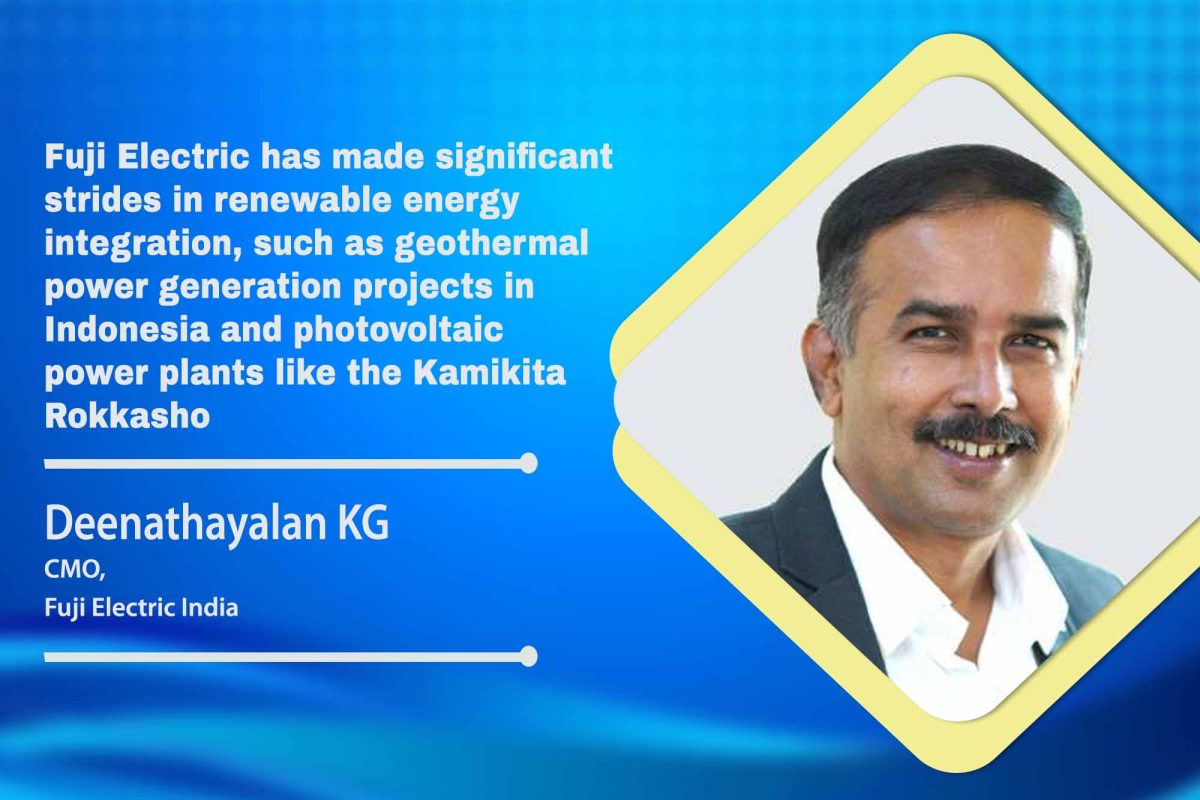Fuji Electric is leading energy transition with innovations
By EPR Magazine Editorial March 27, 2024 11:39 am IST
By EPR Magazine Editorial March 27, 2024 11:39 am IST

Fuji Electric has made significant strides in renewable energy integration, such as geothermal power generation projects in Indonesia and photovoltaic power plants like the Kamikita Rokkasho facility in Japan.
Fuji Electric is pioneering a renewable energy shift in India with advanced solutions aligned with the nation’s ambitious targets. Its expertise in power electronics drives sustainable power generation and infrastructure development. Deenathayalan KG speaks with EPR Magazine, disclosing the company’s plans and innovations.
What are the driving factors behind the energy transition in India?
Indi’s energy landscape is evolving significantly and is driven by ambitious government targets. The country is working towards addressing climate change, aiming to achieve net zero emissions by 2070 and meet half of its electricity needs from renewable sources by 2030. This approach marks a shift from carbon-intensive practices, showcasing a sustainable economic development model.
The scale of transformation is notable, propelled by rapid economic growth and urbanisation. While traditional energy sources like coal and oil have historically fuelled industrial growth and improved energy access, they have also contributed to rising CO2 emissions. However, the country’s per capita emissions remain comparatively low, reflecting its commitment to balancing economic progress with environmental concerns. To meet its targets, India is accelerating its clean energy transition. It has surpassed its COP 21 commitments and is expanding renewable energy capacity, particularly solar and wind. Technological advancements, supportive policies, and private sector participation drive this transition, making renewable energy more competitive.
What are the key focus areas for Fuji Electric in energy transition and power stabilisation?
Fuji Electric is leading the way in contributing to sustainable societies through its energy creation and social infrastructure solutions. It is driven by the urgent need to increase the use of renewable energies, reduce CO2 emissions, and promote sustainability. Leveraging power electronics technology, Fuji Electric provides crucial power generation and system stabilisation solutions to address global challenges like climate change and energy security.
In India, we have played a vital role in developing renewable energy projects, committed to bringing solutions that enable our customers to have an advanced range of renewable power solutions. This also demonstrates our commitment to supporting India’s energy transition and addressing environmental challenges. Our 100 years of global expertise in power electronics extends to photovoltaic power plants, delivering high-efficiency power conditioning sub-systems (PCSs) for grid-independent power supply modes aligning perfectly with country’s renewable energy goals.At Fuji Electric, we focus on social infrastructure solutions, developing seismic-resistant switchboards for commercial nuclear reactors, distribution static var compensators, and static synchronous compensators to suppress voltage fluctuations in distribution systems. These solutions contribute significantly to India’s efforts to enhance energy efficiency and reliability across its infrastructure networks.
What are some challenges and opportunities in the sector?
India’s transition from fossil fuels to renewables is driven by the need to address climate change, with a focus on reducing greenhouse gas emissions. India aims to achieve net zero emissions by 2070, emphasising the importance of green energy solutions. Initiatives like PM-KUSUM and the Production Linked Incentive (PLI) scheme promote solar energy and domestic manufacturing to reach the target of 450 GW renewable energy capacity by 2030, per the WSDS report. This transition presents opportunities for innovation, job creation, environmental benefits, global leadership in sustainable development, economic growth, social inclusion, and improved public health outcomes by reducing pollution-related risks. Challenges include energy poverty, import dependence, climate-related disruptions, and gender disparities in energy access, which require a comprehensive approach, including empowering women, diversifying supply chains, promoting green transport, and adopting circular economy practices for a sustainable and inclusive transition.
What strategies does Fuji Electric apply to tap the evolving market?
At Fuji Electric, we strategically apply innovative solutions to tap into the evolving energy transition market. The company’s efforts in energy creation and social infrastructure solutions showcase its commitment to creating responsible and sustainable societies. For example, Fuji Electric has made significant strides in renewable energy integration, such as geothermal power generation projects in Indonesia and photovoltaic power plants like the Kamikita Rokkasho facility in Japan. By leveraging its expertise in power electronics technology at Fuji Electric, we are contributing to the transition towards clean and reliable energy sources, aligning with the market’s growing demand for sustainable solutions.
Spokesperson: Deenathayalan KG – CMO Fuji Electric India
We use cookies to personalize your experience. By continuing to visit this website you agree to our Terms & Conditions, Privacy Policy and Cookie Policy.